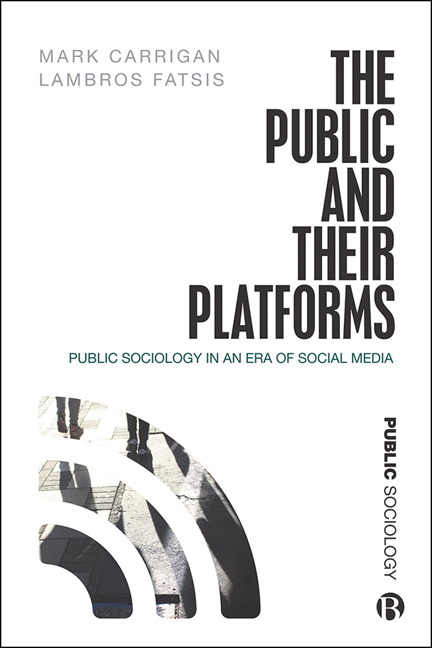Book contents
- Frontmatter
- Contents
- Acknowledgements
- Series Editors’ Preface
- Introduction
- 1 Defining ‘the Public’
- 2 The History of Platforms
- 3 Between Publics and Platforms
- 4 Sociology and its Platforms
- 5 The Past, Present and Future of Public Sociology
- 6 Making Sociology Public
- 7 Making Platforms Public
- 8 Assembling Public Sociology
- Notes
- References
- Index
5 - The Past, Present and Future of Public Sociology
- Frontmatter
- Contents
- Acknowledgements
- Series Editors’ Preface
- Introduction
- 1 Defining ‘the Public’
- 2 The History of Platforms
- 3 Between Publics and Platforms
- 4 Sociology and its Platforms
- 5 The Past, Present and Future of Public Sociology
- 6 Making Sociology Public
- 7 Making Platforms Public
- 8 Assembling Public Sociology
- Notes
- References
- Index
Summary
For many sociologists, public sociology and Michael Burawoy are indelibly associated, as if it were a project he initiated with his presidential address to the American Sociological Association in the early years of the 20th century. Though understandable when one figure has played such a crucial role in popularizing the term, such mental associations betray a complex history which precedes his formulation. In tracing the origins of the term ‘public sociology’, one is immediately confronted with a penumbra of problems; historical, epistemological, philosophical, ethical and political alike. Historical because there is no adequate historiography of the term, philosophical because it is an immensely difficult term to accurately pinpoint without the risk of sounding arbitrary or selective, ethical because the term's parentage is uncertain, with Gans (1989), Seidman (1998), Agger (2007) and Burawoy (2005) all aspiring to the role of the putative father, and lastly, political because, as Becker (2003: 661) notes, ‘what things are called always reflects relations of power’, with aspirations to legitimation, recognition, influence, and authority.
This concatenation of dilemmas makes it difficult to establish any authoritative definition of the term ‘public sociology’, or provide any accurate depiction of where it resides in the relevant literature and public usage. Rather than an attempt to describe ‘public sociology’ as an ineluctable fact of the discipline's history, we approach it for these reasons as an ongoing, and often confusing intellectual debate. We are much more interested in the debates which now tend to be signposted using the terminology of public sociology than we are in the term itself. In this way we hope to remain grounded in the existing literature while moving beyond it to engage with the field of practice often named using this term but which inevitably extends far beyond the naming power it is able to exercise. It also means that the thrust of our argument is relevant for other disciplines making a public turn (public anthropology, public criminology, public humanities, and so on) even if the substance of it remains oriented towards sociology. Under the platform ecosystem we all, as Healy (2017: 780) puts it, ‘face the challenge of figuring out how to work successfully in a latently public, ambiently visible way’.
- Type
- Chapter
- Information
- The Public and their PlatformsPublic Sociology in an Era of Social Media, pp. 103 - 126Publisher: Bristol University PressPrint publication year: 2021



